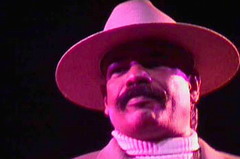Pedrito Calvo celebrates 50 years of making music
- Submitted by: admin
- Arts and Culture
- Music
- 04 / 19 / 2007

"One of those rifles is mine," says this legendary Cuban singer whose face hides all signs of the passage of time. "I was there, in front of the makeshift stage set up at 23rd and 12th that April 16, 1961 [When Fidel Castro proclaimed the socialist nature of the Cuban Revolution]. I had just returned from the Escambray mountains, alongside my comrades of the militia battalion after three months of sweeping the area in search of members of the counter-revolutionary."
April has a special place in the heart and soul of Pedrito Calvo. In April 1957, he sang in public for the first time on the radio program La Corte Suprema del Arte. Four years later, in the very same month, he heard Fidel Castro proclaim the socialist nature of the Cuban Revolution.
"What was happening in the country demanded my involvement," says the popular singer. For the first time, we the poor, the blacks, the people that were forced to do magic to survive, were taken care of. From then until now, I can not conceive of myself without the [Cuban] Revolution and my people."
As a child, Pedro Calvo Rojas was surrounded by music. His father was a musician and band leader. "But I could not make a living from music, so I became a shoemaker, a hard job since in Guanabacoa, my neighborhood, there were lots of good shoemakers."
After his first appearance 50 years ago, he started to sing with his fathers band and later joined the Jovenes del Filin, the Elio Reve orchestra and the Ritmo Oriental band, in which he had a hit singing the song Que baile Mule. Afterwards he joined the legendary orchestra, Los Van Van.
"I spent 27 years of my life with Formell [bandleader of Los Van Van] and other excellent musicians, touring the world, mixing our music with other cultures, 27 years of true professional growth."
Pedro Calvo tells the story of how he adapted his trademark, the ever present sombrero. "One day I saw a hat at a craft workshop in the Vedado neighborhood. I tried it on. When I looked at myself in the mirror, I agreed with what the people who were with me said, 'It fits you perfect, Pedrito. A few weeks later, I took a trip to Mexico with Los Van Van, and I bought one and learned how to straighten out the brim. Ever since then, I have always used a hat on stage."
"Once I lost my hat on a bus, and my friend Candido Fabre took advantage of the situation to write what became a popular song, Quien ha visto por ahi, mi sombrero de yarey? (Has any body seen my wide-brimmed hat?). Candido gave me the song to sing, but for some reason, Formell never included it in the bands repertoire, and I never sang it."
Do you miss Los Van Van?
"That was a beautiful, unforgettable time. But I am the kind of person who likes to move on. So I formed the band La Justicia. But it did not work out the way I wanted. So I started another band, La Nueva Justicia, which is sounding the way I like. With them I am recording old Van Van hits, these are the songs people want to hear at our performances. Of course, there are also new songs, boleros and sons. One cannot stay frozen in time."
From the first time in front of a microphone, Pedrito learnt a lesson. "I had chosen a very male-chauvinist song that was popular at the time, a song written by Rolando Laserie. Isolina Carrillo warned me, 'Why dont you sing something less hurtful? So I sang La barca. That piece of advice marked my career. You can say funny things in your songs, you can be entertaining, but there is no need to insult people or to be vulgar. The more the public loves you and appreciates your work, the stricter you have to be in choosing your repertoire. One has to respect the audience if you want to earn their respect."
By Pedro de la Hoz, Granma
Comments